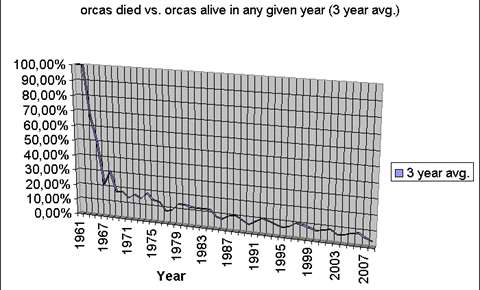 Eleven days ago, we questioned whether it might be immoral to keep certain animals captive in zoos. Our hunch is that a species’ ability to thrive in a zoo is based not only on its physical needs, but also its intelligence—animals who become aware of the limits of their existence will certainly suffer psychological stresses that can lead to early demises, or so our random thesis goes.
Eleven days ago, we questioned whether it might be immoral to keep certain animals captive in zoos. Our hunch is that a species’ ability to thrive in a zoo is based not only on its physical needs, but also its intelligence—animals who become aware of the limits of their existence will certainly suffer psychological stresses that can lead to early demises, or so our random thesis goes.
We’d like to pick this thread back up today by looking at one of the most intelligent animals ever held captive for Homo sapiens‘ amusement: the killer whale. As demonstrated by the chart above, taken from a German anti-captivity site, marine parks have gotten a whole lot better at keeping orcas alive since the early days of Corky. But there seems to be only so much humans can do to provide cetaceans with a comfortable existence:
Within in the initial years of killer whales in captivity there was substantial improvement in keeping the animals alive, but since the mid 70’s the situation has stagnated. Orcas in captivity are still far away from reaching their natural life expectancies. This is quite astonishing if you consider the amount of medical treatment and observation put into those animals. It is difficult to prove but the quality of life might be the deciding factor in this puzzle.
A more detailed study appeared in a 1995 issue of Marine Mammal Science. The conclusion was just as damning:
Survival of the wild population Olesiuk et al. studied, based on approximately 250 non-calves, was significantly higher than our estimates for non-calf captive killer whales (0.976 vs. 0.938, P<0.001).
As a commenter noted in our previous post, the decline in life expectancy should probably be weighed against less tangible benefits of captivity—particularly the raising of awareness among zoo-goers, who in turn may dedicate time or money to aiding wild populations. But is there any data to support the theory that zoo (or marine park) patrons are greater supporters of animal causes? If not, we suspect that killer whales may fall into the category of animals who really shouldn’t be kept in tanks for human entertainment.
There’s a list of all orcas currently in captivity here. And don’t forget that we recently touched upon our two-toned cetacean friends in an episode of Bad Movie Friday.


Captured Shadow // Aug 25, 2009 at 4:11 pm
I have some mixed feelings about zoos too. I really love to see those interesting animals, but the ones that are usually most interesting are the ones that probably should not be there. Big cats, orcas, dolphins, birds of prey, gorillas…etc. On the other hand, I have no problem with fishes, insects, or reptiles in cages and they can be fun to watch too. Maybe your correct, about the intelligence that lets them know they are captured being the threshold. Cows, or chickens seem fine in pens…..
Brendan I. Koerner // Aug 25, 2009 at 8:25 pm
Yeah, as I may have written in the prev. post, seeing the adult gorillas at the Bronx Zoo sorta changed my mind on this issue–or at least pushed it into shades-of-gray territory. It was sad to see the kids so full of life, bouncing off the plexiglass. And then you’d look back and see the silverbacks just sitting there with thousand-yard-stares…